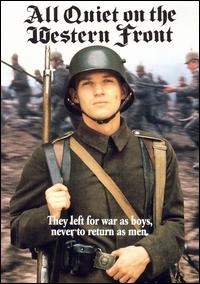Plot
In 1914, 18-year-old Paul Bäumer enlists in the German army with five school friends (Behm, Kropp, Muller, Kemmerich and Leer), after being indoctrinated by Kantorek, their teacher, as to the superiority of German culture. After surviving training camp under Corporal Himmelstoss, a harsh disciplinarian, the men board a troop train bound for the Western Front, as another train arrives loaded with returning wounded.
At the front line they are assigned to a squad with Tjaden, Westhus, Detering and others, under the leadership of Stanislaus "Kat" Katzinsky, an older recalled reservist. Kat teaches them survival skills.
When Paul and his squad rotate from the line into French billets, they are joined by a replacement draft led by Himmelstoss who no longer intimidates them.
The French and German armies are shown attacking each other repeatedly over a few hundred yards of torn, corpse-strewn land. During one attack, Paul catches Himmelstoss hanging back and Paul forces him to keep up with the rest. Kemmerich is wounded, and later dies in an overcrowded army hospital, unnerving Paul.
In another action, a French soldier seeks cover in the same crater as Paul, who stabs him in the stomach. Trapped in the crater, Paul tries to bandage the Frenchman's wounds, but he dies and Paul escapes, stricken with guilt.
Although Paul, Kropp and Leer have their first sexual experience with a trio of accommodating French village girls, the vast majority of the young men's experiences are horrific. One by one, practically all of Paul's schoolmate friends die. Kaiser Wilhelm II (Denys Graham) visits their camp to ceremoniously pin medals on heroic soldiers, including Himmelstoss.
Behm dies in a shelling behind the lines while Kropp loses a leg and Paul is seriously wounded. Paul returns home on recuperation leave and learns their mother is dying of cancer. In visits to a beer garden and to his former teacher, Paul realises that his town's older men, in their enthusiasm for war, have no sense of the horrors they have sent their youths to. He also visits Kemmerich's mother and lies to her that he did not suffer.
After returning to duty, Kat is wounded in the leg by shrapnel and Paul carries him to a field hospital, discovering that Kat had bled out during the journey.
Paul writes to Kropp, the sole survivor of their class, now an amputee. Checking on the younger soldiers in their trench, he starts to sketch a bird he encounters. When the bird flies away, Paul stands up and a sniper's shot rings out. A field communique from the German High Command is captioned over Paul's lifeless body, declaring "All Quiet on the Western Front", the date on the communique showing '11 October 1918', exactly one month before the Armistice of 11 November 1918.
